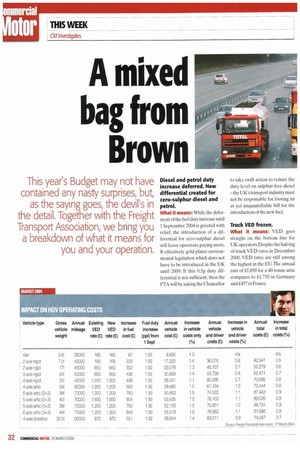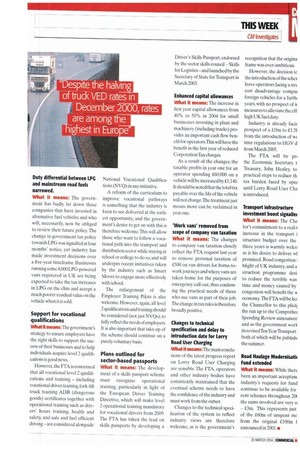A mixed bag from Brown
Page 32

Page 33

If you've noticed an error in this article please click here to report it so we can fix it.
This year's Budget may not have contained any nasty surprises, but, as the saying goes, the devil's in the detail. Together with the Freight Transport Association, we bring you a breakdown of what it means for you and your operation.
Diesel and petrol duty increase deferred. New differential created for zero-sulphur diesel and petrol.
What It means: While the deferment of the fuel duty increase until 1 September 2004 is greeted with relief, the introduction of a differential for zero-sulphur diesel will leave operators paying more. It effectively gold-plates environmental legislation which does not have to be introduced in the UK until 2009. If this 0.5p duty differential is not sufficient, then the FTA will be asking the Chancellor to take swift action to reduce the duty level on sulphur-free diesel -the UK's transport industry must not be responsible for footing an as yet unquantifiable bill for the introduction of the new fuel.
Truck VED frozen.
What it means: VED goes straight on the bottom line for UK operators. Despite the halving of truck VED rates in December 2000. VED rates are still among the highest in the EU. The annual rate of £1,850 for a 40-tonne artic compares to £1.710 in Germany and £457 in France.
Duty differential between LPG and mainstream road fuels narrowed.
What it means: The government has badly let down those companies that have invested in alternative fuel vehicles and who will, necessarily. now be obliged to review their future policy. The change in government tax policy towards LPG was signalled at four months' notice, yet industry has made investment decisions over a five-year timeframe. Businesses running some 4,000 LPG-powered vans registered in UK are being expected to take the tax increases in LPG on the chin and accept a much poorer residual value on the vehicle when it is sold.
Support for vocational qualifications
What it means: The government's strategy to ensure employers have the right skills to support the success of their businesses and to help individuals acquire level 2 qualifications is good news However, the FTA is concerned that all vocational level 2 qualifications and training — including vocational driver training, fork-lift truck training ADR (dangerous goods) certificates together with operational training such as drivers' hours training, health and safety, and safe and fuel efficient driving — are considered alongside National Vocational Qualifications (NVQ) in any initiative.
A reform of the curriculum to improve vocational pathways is something that the industry is keen to see delivered at the earliest opportunity, and the government's desire to get on with this is therefore welcome, This will allow those who want to follow a vocational path into the transport and distribution sector while staying at school or college to do so: and will underpin recent initiatives taken by the industry such as Smart Moves to engage more effectively with school.
The enlargement of the Employer Training Pilots is also welcome. However, again, all level 2 qualifications and training should be considered (not just NVQs), to fully reflect the needs of employers. It is also important that take-up of the scheme should continue on a purely voluntary basis.
Plans outlined for
sector-based passports What it means: The development of a skills passport scheme must recognise operational training, particularly in light of the European Driver Training Directive, which will make level 2 operational training mandatory for vocational drivers from 2009. The FTA has taken the lead on skills passports by developing a Driver's Skills Passport, endorsed by the sector skills council — Skills for Logistics— and launched by the Secretary of State for Transport in March 2003.
Enhanced capital allowances What it means: The increase in first year capital allowances from 40% to 50% in 2004 for small businesses investing in plant and machinery (including trucks) provides an important cash flow benefit for operators.This will have the benefit in the first year of reduced Corporation Tax charges.
As a result of the changes, the taxable profits in year one for an operator spending £60,000 on a vehicle will be increased by £1,140. It should be noted that the total tax payable over the life of the vehicle will not change.The treatmentjust means more can be reclaimed in year one.
'Work vans removed from
scope of company van taxation What it means: The changes to company van taxation closely reflect the FTA request last year to remove personal taxation of £500 on van drivers for home-towork journeys and where vans are taken home for the purposes of emergency call-out, thus confirming the practical needs of those who use vans as part of their job. The change in tax rules is therefore broadly positive.
Changes to technical specification and delay to introduction date for Lorry Road User Charging
What it means:The main conclusions of the latest progress report on Lorry Road User Charging are sensible. The FTA, operators and other industry bodies have consistently maintained that the eventual scheme needs to have the confidence of the industry and must work from the outset.
Changes to the technical specification of the system to reflect industry views are therefore welcome, as is the government's recognition that the origina frame was over-ambitious.
However, the decision to the introduction of the scher leave operators facing a stn. cost disadvantage compai foreign vehicles for a furthi years, with no prospect of it measures to alleviate the elf high UK fuel duty.
Industry is already facir prospect of a £1bn to £1.51 from the introduction of we time regulations to HGV d from March 2005.
The FTA will be pri the Economic Secretary t Treasury, John Healey, to practical steps to reduce th tax burden faced by opei until Lorry Road User Cha is introduced.
Transport infrastructure investment boost signalle( What it means: The Cho lor's commitment to a real-i increase in the transport i structure budget over the three years is warmly welco as is his desire to deliver wl promised. Road congestion blight of UK industry, and a struction programme desi to reduce the terrible wasi time and money caused by congestion will benefit the v, economy. The FTA will be ho] the Chancellor to this pledl the run up to the Comprehet Spending Review announcer and as the government work its revised Ten Year Transport I both of which will be publishi the summer.
Road Haulage Modernisatii Fund extended
What it means: While there been an important acceptanc industry's requests for fund continue to be available for rent schemes throughout 20( the sums involved are very si — £3m. This represents just of the £60m of unspent mc from the original £100m f announced in 2001.w






























































































































































































